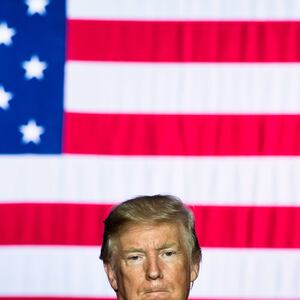Sometimes our words betray us. After a flailing defense of his past position on busing, Joe Biden declared, “My time is up. I’m sorry.” As debate moments go, this line seemed like a metaphor. A few days later, Donald Trump committed his own Kinsley gaffe. Upon becoming the first sitting U.S. president to traverse into North Korea, he declared: “Stepping across that line was a great honor.”
Did he cross a line? Self-awareness has never been his strong suit, and it was unquestionably a great honor for Kim Jong Un.
Trump’s defenders have a valid point, at least in the abstract, about the potential benefits of stepping across lines. Protocols and traditions can become stifling or antiquated. There’s something to be said for unconventional thinking. Whether that means keeping your adversaries off balance (see Richard Nixon’s “madman theory”) or—in the other direction—breaking norms regarding preconditions (see Obama’s willingness to negotiate with Iran), presidents sometimes have to shake things up if they expect to achieve a new result.
ADVERTISEMENT
The key word here is sometimes. Here, I wish someone would talk to Donald Trump about “Chesterton’s fence” (which has nothing to do, by the way, with a border wall). If you’re not familiar with the principle, English writer G.K. Chesterton famously noted that if a person were to come upon a seemingly superfluous fence in the woods, the correct response should not be to immediately tear it down, but rather, to ponder why it was put there in the first place.
This speaks to Trump’s rather unconservative worldview. He seems to believe that traditions and norms are arbitrary or antiquated—guardrails created for (and abided by) lesser men. Some norms, no doubt, have outlived their usefulness. But has Trump put in the time and effort to think through why these guardrails were put there in the first place? Why is it that no past sitting president has accepted the “great honor” of visiting North Korea? Has he considered the precedents this might set by legitimizing a murderous dictator, the incentives this might create, or the leverage now lost to future presidents?
The only rule Trump seems to honor is that there are no rules.
Another example: Has Trump put in the time or effort to think through why past presidents did not exploit Independence Day for a militaristic display of their personal power? Were they all saps and losers? Did they lack his imagination? Or is it possible that they were practicing discretion and self-control, for the sake of future generations? The danger isn’t just that Trump might further indulge his authoritarian tendencies, but that he would set a precedent that might entice some future president to do so.
A leader who knows history and is making a calculated decision to defy tradition, in service of some larger, coherent plan, has, at least, done their due diligence. Their move may or may not work out, but at least they made an informed bet.
A maxim attributed to Picasso says to “Learn the rules like a pro, so you can break them like an artist.” But has Trump learned any rules? It’s hard for me to believe that a man who thinks western “liberalism” is about Los Angeles and San Francisco —or that the issue of “busing” is merely one of logistics and transportation—fully grasps the consequences of his unconventional words and deeds.
What are Trump’s motives? Does he have a plan? If Trump were intentionally employing unorthodox tactics in order to achieve a coherent and virtuous goal, I might cheer him as he rolls the dice with Kim. But it seems much, MUCH more likely that this is about his desire for drama, for a photo-op (to change the subject from the 2020 Democratic debate back to Trump), and to make history for the sake of making history.
That’s what Trump got. But what was the cost? One imagines that a presidential visit to North Korea would be used as a reward to commemorate some sort of agreement that actually has teeth in terms of denuclearizing this hostile regime. What has Kim done to deserve this honor? Nothing, so far as I can tell. But it is now the case that a future president may have just lost one big potential incentive that could have been used as leverage in the future. Why buy the cow when you’ve already gotten the milk… for free?
Trump’s supporters have suspended disbelief. They are utterly convinced that his instincts are brilliant and that he is sort of magical. Indeed, the man is lucky. He won a miraculous election, and (perhaps, even more amazing) seems headed for re-election. For this reason (and others), his supporters do not apply the same standards toward him that they might apply to anyone else. This, of course, is incredibly dangerous. History is littered with leaders who were wildly lucky, until they weren’t.
But even if Trump stays lucky and keeps escaping the consequences of breaking norms, it’s worth wondering what happens next.
Someday, Donald Trump will leave the White House. You and I will hopefully still be here. And Kim will still have his nukes, more and more of them.
And then what?






